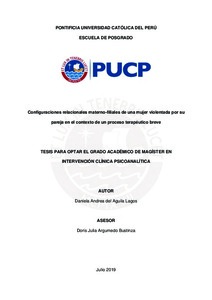Configuraciones relacionales materno-filiales de una mujer violentada por su pareja en el contexto de un proceso terapéutico breve
Abstract
La violencia contra las mujeres es una de las problemáticas sociales con más incidencia
en el contexto peruano actual. Debido a que esta suele surgir dentro del ámbito familiar, las
investigaciones exponen que el maternaje de las madres que han sido violentadas se ve afectado,
pero sus resultados son contradictorios respecto a cuál es el impacto. Por ello, la presente
investigación busca comprender las configuraciones relacionales materno-filiales de una mujer
víctima de violencia, así como describir las cualidades particulares de las mismas a lo largo del
proceso de terapia. Para ello, se llevó a cabo un análisis temático de los episodios relacionales
y narrativas relacionales de una mujer violentada con sus hijos, obtenidos de la transcripción
literal de los audios del proceso terapéutico. Los hallazgos muestran distintos niveles de
violencia que atraviesan las configuraciones materno-filiales de la consultante con sus hijos,
los cuales se evidenciaron en la caracterización de las representaciones, deseos y respuestas
encontradas. Además, se encontraron configuraciones ambivalentes y contradictorias, lo cual
reflejan la propia vivencia de la consultante sobre su maternidad y la dificultad para integrar
sus experiencias. Sin embargo, hacia el final de la terapia muestra una mayor integración en sus
configuraciones materno-filiales, así como representaciones del self y de su hija como agentes
de su propia vida. Así, se puede decir que en el transcurso del proceso habría tenido la
oportunidad de reeditar los vínculos consigo misma y con sus hijos, a pesar de no ser el objetivo
del mismo. Intimate partner violence (IPV) is a social topic that is currently relevant in Peruvian
society as it is greatly prevalent, being women the main gender affected by it. Due to it often
emerging within families, investigations show that mothering of women who have experienced
IPV can also be affected, but there are contradictory findings about how it is impacted. For that
reason, this study aims to understand the relational configurations between a mother who has
experienced IPV and her children, as well to describe the characteristics found in her
configurations throughout therapy. To achieve that, we conducted an inductive thematic
analysis of the relational episodes and narrations between a mother who has experienced IPV
and her children, taken from the literal transcriptions of the audio recordings of the therapy
sessions. Findings suggest that there are different levels of violence that are evidenced within
the relational configurations with her children, based on the characteristics of the
representations, wishes and responses found. Also, the configurations that emerged were
ambivalent and contradictory, qualities that reflect how the consultant experiences her own
maternity and how difficult it is for her to perceive situations and people in an integrated
manner. Nevertheless, towards the end of the therapeutic process she shows greater integration
in her relational configurations with her children, as well as representations of self and her
daughter centered around the agency in their own lives. Therefore, throughout the process the
consultant would have been able to reedit the relationship with herself and her children, even
though that was not the focus of the therapy.
Temas
Mujeres--Aspectos psicológicos
Violencia familiar
Violencia contra la mujer
Psicoterapia breve
Terapeutas y pacientes
Maternidad--Aspectos psicológicos
Violencia familiar
Violencia contra la mujer
Psicoterapia breve
Terapeutas y pacientes
Maternidad--Aspectos psicológicos
Para optar el título de
Maestro en Intervención Clínica Psicoanalítica





